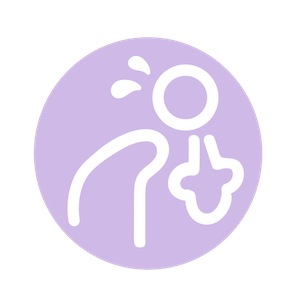Tiredness, fatigue and exhaustion
Pregnancy symptoms

It’s common to feel exhausted during pregnancy, especially in the first 12 weeks.
Sleep and exhaustion
Hormonal changes at this time can make you feel tired, nauseous and emotional. You can only try to rest as much as possible, sit with your feet up during the day, and accept any offers of help from colleagues and family. Although this rundown feeling can make you feel low, you need to look after your physical health. Make sure you eat a healthy diet and get plenty of rest and sleep.
Later on, the extra weight you are carrying may wear you out. As your bump gets bigger, it can be difficult to get a good night’s sleep. You might find it uncomfortable to lie down; when you get comfortable, you might have to go to the loo.
Tiredness won’t harm you or your baby, but it can make life feel more difficult, especially before telling people about it.
Odd dreams
Some women have strange dreams or nightmares about the baby, labour or birth. It is normal; talking about them to your partner or midwife can help you. However, remember that dreaming of something doesn’t mean it’s going to happen. Relaxation and breathing techniques may be helpful in reducing your anxiety.
Sleeping positions
Lying on your back after around 16 weeks of pregnancy can be uncomfortable. It may also mean later that your womb presses on one of the main blood vessels, which can make you feel faint.
Sleeping on your side might be more comfortable. You can try supporting your bump with pillows or putting a pillow between your knees as well. As your bump becomes heavy towards the end of pregnancy, you might prefer to prop yourself up with pillows so that you’re almost in a sitting position. Sleeping this way can sometimes help with pregnancy heartburn as well.
Dealing with insomnia during pregnancy
Don’t get bothered much if you can’t sleep because it won’t harm your baby. If you can, nap during the day, and get some early nights during the week. Avoid tea, coffee or cola in the evening too as the caffeine can make it harder to go to sleep.
Try to rest before bedtime so that you’re not wide awake at night. Relaxation techniques may also help. Your antenatal classes may teach such methods, or you can borrow a relaxation tape, CD or DVD from a library.
You may join an antenatal yoga or pilates class. Make sure the instructor knows that you are pregnant. Exercise can help you to feel less tired, so try to do activities like walking at lunchtime or swimming during the day. If the lack of sleep still bothers you, talk to your partner, a friend, doctor or midwife.
Why pregnancy induces insomnia?
Occasionally, sleeplessness – when accompanied by other symptoms – can be a sign of depression. If you have any of the other symptoms of this disorder, such as feeling hopeless and losing interest in the things you used to enjoy, speak to your doctor or midwife. There is a treatment that may help you.
Verified:
Dr. Wanwadee Sapmee Panyakat (OB-GYN), license no. 41208 (2 February 2020)



